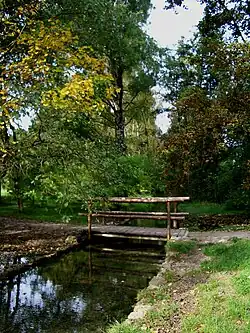| Brunnbach | |
|---|---|
 | |
| Location | |
| Country | Germany |
| State | Bavaria |
| Physical characteristics | |
| Source | |
| • location | Herzogpark |
| Mouth | |
• location | Isar at the bridge St. Emmeram |
• coordinates | 48°10′45″N 11°37′34″E / 48.1792°N 11.6261°E |
| Length | about 3 kilometres (1.9 mi) |
| Basin features | |
| Progression | Isar→ Danube→ Black Sea |
Brunnbach is a small river of Bavaria, Germany. It is about 3 kilometres (1.9 mi) long and flows through the district Bogenhausen in Munich. It is a right tributary of the Isar.
Course
The present-day Brunnbach has its source in the bank of the Isar in the former Montgelas Garden in today's Herzogpark area of Bogenhausen. At its beginning, the river crosses several private grounds and partly flows in pipes. A public lawn follows at the Brunnbachleite. After the inn "Wirtshaus im Grüntal" that was closed 2001, the stream runs through private grounds, then follows the Mittlere-Isar-Kanal (a canal) in straight line, flows through the aera of the district St. Emmeram of the Bogenhausen district and flows after about 500 meters (1,600 ft) through a sewer pipe under the Mittlere-Isar-Kanal. On the isle of the Isar in Oberföhring, it supplies a pond by means of a pumping station in the landmarked "Pumpenwärterhäuschen" (house of pumping engineer). The majority of its water reaches the surface at the north of the St. Emmeram bridge from a stone mouth designed as foutain, and then flows into the Isar in two arms.
History
Until the end of the 19th century, the Brunnbach's source was near Bad Brunnthal in the lower Bogenhausen and, like today, reaches the Isar river at St. Emmeram. From the 10th to the 19th century, in Grüntal and St. Emmeram the Brunnbach powered four mills.
At the time the Herzogpark was covered with buildings the Brunnbach was filled up north of the street Montgelaßstraße. The former upper course in the Maximiliansanlagen park is now a river of its own called Brunnthaler Quellbach.
Because of its purity, the water was regarded as curative water. In the 17th century, Brunnthal became a well-known spa, and its operation was continued until 1914. Even today, the springs of Brunnbach have drinking water quality.
In the course of the uncoverage of the Munich rivers, a renaturation of the Brunnbach was also discussed in the 1990s. Not earlier than 10 years later, the section between the Abacostraße and the Opitzstraße was relocated into a new bed within the municipal green area.
The Brunnbach served Thomas Mann as a model for the river in his novella A Man and His Dog (Herr und Hund).